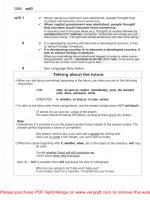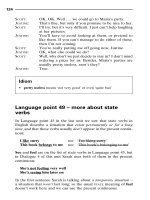Tài liệu Opportunities in technical writing careers part 15 pdf
Bạn đang xem bản rút gọn của tài liệu. Xem và tải ngay bản đầy đủ của tài liệu tại đây (87.07 KB, 10 trang )
and this subfield of technical communications should grow rapidly.
Machine translation is an exciting employment possibility for trans-
lators—those people gifted in more than one language and with
the ability to write well.
You may be more familiar with CAT, computer-aided transla-
tion. To aid in the usage of CAT, companies are approaching trans-
lation in stages. First a glossary, or vocabulary, of the most common
technical terms used by that company for foreign translation is
drawn up for the translators as well as for other writers. This glos-
sary is entered into the database, followed by, for example, a page
of a manual. This is pre-edited and then applied to the glossary.
Words in the original piece of work are now transformed by the
glossary, or glossarized, and the piece of writing is returned to the
translator for its completion and final editing. Of course, this is an
oversimplification of the process, but it may provide you with some
idea of what is meant by CAT and machine translation. This devel-
opment is by no means foolproof, but it does show the direction
translation efforts are taking.
Systems of oral dictation to the computer also are being devel-
oped for translation purposes. Eventually, words spoken in one lan-
guage may be computer processed and translated into another.
Computer Documentation
Computers are certainly no longer novel, but their increased use in
every area has presented a challenge for the technical writer to pro-
duce clear and usable computer-related documents. Lack of ade-
quate documentation, that is, the written form of all the available
information about a particular computer, computer program, or set
of programs, is a major problem in modern industry. Documenta-
Related Fields and Growing Trends 131
tion in its many forms, such as operating instructions, trou-
bleshooting and repairs, user guides, and so forth, is essential for
management information on systems development and for proper
coordination of subsequent phases of systems development and use.
This documentation is often not thorough, nor is it done at the
same time that the system is developed. Sometimes it is never done
at all. The technical writer must be able to step into the complex
documentation process and quickly and accurately prepare such
forms as the job run manual, the job control language manual, the
balancing and control manual, the key processing manual, and the
job scheduling manual.
Obviously, special training is necessary for the technical writer
to function effectively in preparing systems documentation. Some
schools offer training programs that train technical writers for the
computer industry. Most such programs offer computer science
courses and training in writing operating instructions and pro-
gramming reference manuals. This is just the beginning of the expe-
rience a technical writer must accumulate to function effectively in
the area of systems documentation.
Many technical writers today are deeply involved in computer
programming and able to analyze databases, while they are also
familiar with software psychology, human factors, and ergometrics
(the study of the ability of humans to adjust to their environment).
The preparation of manuals for people unfamiliar with data pro-
cessing and programming is a continuation of what has long been
a major role of the technical writer, bridging the information gap
between the technical and the nontechnical person.
Some professionals feel that technical writers are well suited for
program design because they are best qualified to design the infor-
mation package for the beginning user. For instance, IBM hires
132 Opportunities in Technical Writing Careers
technical writers to produce user manuals for their personal com-
puters. The writer must learn what kinds of documents best fit the
needs of the home computer buyer and what form would be best
for these documents. This may require analyzing existing docu-
ments, interviewing users and designers, and generally converting
technical and highly specialized language to language that the non-
specialist can understand.
Looking Ahead
The need for technical writers should remain steady because tech-
nical writing is not a routine job. As you have seen, new develop-
ments in communication are continually occurring, and it is widely
accepted by industry that communication is the pipeline to global
business.
You now know about the training and qualifications you’ll need
to pursue a career in technical communications and the many areas
in which you might find work. If this is the profession that inter-
ests you, be confident that the opportunities are there for a serious,
well-trained technical writer.
Related Fields and Growing Trends 133
This page intentionally left blank
Appendix
Professional Associations
Following is a list of associations that serve the field of technical
communication.
Society for Technical Communication
The official society of the technical writing profession is the Soci-
ety for Technical Communication (STC). Members have opportu-
nities to exchange ideas, express their views, and utilize programs
that benefit them in the advancement of their careers. Some
regional chapters have been very active in their industrial commu-
nities in bringing business and education together, presenting
important speakers, and developing writing workshops.
Whether you are a student or a practicing technical writer, you
should plan to attend the annual conferences of the Society for
Technical Communication, which is held each spring in various
locations around the country. Conferences generally attract thou-
sands of members and feature speakers from around the world. Pre-
sentations are made on every aspect of the profession, and you will
135
Copyright © 2008 by The McGraw-Hill Companies, Inc. Click here for terms of use.
have the opportunity to learn firsthand from experienced techni-
cal communicators.
For complete information on membership and other society
information, contact:
Society for Technical Communication
901 N. Stuart St., Ste. 904
Arlington, VA 22203
www.stc.org
Other Professional Associations
There are a number of professional societies devoted to more spe-
cialized forms of technical communication, as well as others that
cover more general aspects of education.
Accrediting Council on Education in Journalism and Mass
Communications
Stauffer-Flint Hall
1435 Jayhawk Blvd.
Lawrence, KS 66045-7575
www2.ku.edu/~acejmc
American Advertising Federation
1101 Vermont Ave. NW, Ste. 500
Washington, DC 20005-6306
www.aaf.org
American Agricultural Editors Association
P.O. Box 156
New Prague, MN 56071
www.ageditors.com
136 Appendix
American Association for the Advancement of Science
1200 New York Ave. NW
Washington, DC 20005
www.aaas.org
American Association of Advertising Agencies
405 Lexington Ave., 18th Fl.
New York, NY 10174-1801
www.aaaa.org
American Chemical Society
1155 16th St. NW
Washington, DC 20036
www.chemistry.org
American Medical Writers’ Association
40 W. Gude Dr., Ste. 101
Rockville, MD 20850-1192
www.amwa.org
American Society of Indexers
10200 W. 44th Ave., Ste. 304
Wheat Ridge, CO 80033
www.asindexing.org
American Society for Information Science and Technology
1320 Fenwick La., Ste. 510
Silver Spring, MD 20910
www.asis.org
Professional Associations 137
American Society of Journalists and Authors Inc.
1501 Broadway, Ste. 302
New York, NY 10036
www.asjamail.org
American Society for Training and Development
1640 King St., Box 1443
Alexandria, VA 22313-2043
www.astd.org
American Translators Association
225 Reinekers La., Ste. 590
Alexandria, VA 22314
www.atanet.org
Association of American Publishers
50 F St. NW, 4th Fl.
Washington, DC 20001
www.publishers.org
Association for Business Communication
P.O. Box 6143
Nacogdoches, TX 75962-0001
www.businesscommunication.org
Association for Computing Machinery’s Special Interest Group on
the Design of Communication
2 Penn Plaza, Ste. 701
New York, NY 10121-0721
www.sigdoc.org
138 Appendix
Association for Educational Communications and Technology
1800 N. Stonelake Dr., Ste. 2
Bloomington, IN 47404
www.aect.org
Association of Teachers of Technical Writing
/>Association for Women in Communications
3337 Duke St.
Alexandria, VA 22314
www.womcom.org
Authors Guild Inc.
31 E. 32nd St., 7th Fl.
New York, NY 10016
www.authorsguild.org
Canadian Association of Journalists
Algonquin College
1385 Woodroffe Ave., B224
Ottawa, ON K2G 1V8
www.caj.ca
Canadian Association of Teachers of Technical Writing
Canadian Authors Association
www.canauthors.org
Canadian Science Writers’ Association
P.O. Box 75, Station A
Toronto, ON M5W 1A2
www.sciencewriters.ca
Professional Associations 139
Council for the Advancement of Science Writing
P.O. Box 910
Hedgesville, WV 25427
www.casw.org
Council for Programs in Technical and Scientific Communication
www.cptsc.org
Council of Science Editors
CSE Headquarters
c/o Drohan Management Group
12100 Sunset Hills Rd., Ste. 130
Reston, VA 20190
www.councilscienceeditors.org
Dow Jones Newspaper Fund
4300 Route One North
South Brunswick, NJ 08852
/>Editorial Freelancers Association
71 W. 23rd St., 4th Fl.
New York, NY 10010
www.the-efa.org
Health and Sciences Communications Association
39 Wedgewood Dr., Ste. 1A
Jewett City, CT 06351
www.hesca.org
Human Factors and Ergonomics Society
P.O. Box 1369
Santa Monica, CA 90406-1369
www.hfes.org
140 Appendix









